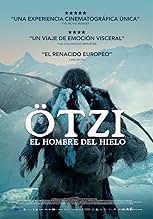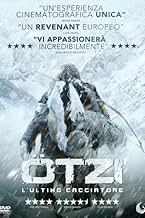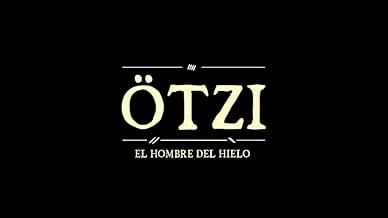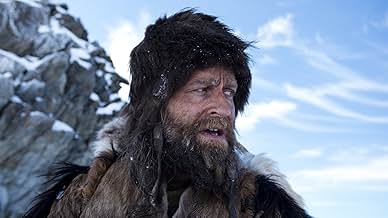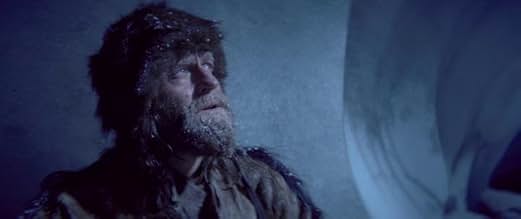CALIFICACIÓN DE IMDb
6.4/10
3.4 k
TU CALIFICACIÓN
Alpes de Ötztal, hace más de 5300 años. Un clan neolítico se ha asentado cerca de un arroyo. Es responsabilidad de su líder Kelab ser el guardián del santuario del grupo Tineka. Mientras Kel... Leer todoAlpes de Ötztal, hace más de 5300 años. Un clan neolítico se ha asentado cerca de un arroyo. Es responsabilidad de su líder Kelab ser el guardián del santuario del grupo Tineka. Mientras Kelab está de caza, el asentamiento es atacado.Alpes de Ötztal, hace más de 5300 años. Un clan neolítico se ha asentado cerca de un arroyo. Es responsabilidad de su líder Kelab ser el guardián del santuario del grupo Tineka. Mientras Kelab está de caza, el asentamiento es atacado.
- Dirección
- Guionista
- Elenco
- Premios
- 5 nominaciones en total
- Dirección
- Guionista
- Todo el elenco y el equipo
- Producción, taquilla y más en IMDbPro
Opiniones destacadas
In 1991, a frozen dead man is found in the Alps. He's been there for 5300 years. "This is his story." Kelab returns from hunting to find his settlement burnt down and his family massacred. A three man war party had come to steal a relic.
It's a little slow to start. It's trying to be authentic which includes limited dialogue and everybody looking like the same caveman. The sets and the costumes seem very authentic. Rather quickly, this gets brutally violent and it's a revenge plot. It becomes a harsh western and that's quite compelling. This can be slow at times especially with the quiet. Nevertheless, this is a simple and effective tale of a brutal age.
It's a little slow to start. It's trying to be authentic which includes limited dialogue and everybody looking like the same caveman. The sets and the costumes seem very authentic. Rather quickly, this gets brutally violent and it's a revenge plot. It becomes a harsh western and that's quite compelling. This can be slow at times especially with the quiet. Nevertheless, this is a simple and effective tale of a brutal age.
A history of our ancestor. Love for the Iceman. Salute to his vengeance.
Not a bad movie, "Der Mann aus dem Eis" gets weighed down by its "plot" which concentrates on Ötzi's violent death and the days before, creating a murder and revenge story with lots of violence but no levity at all.
The movie gets plus points for trying to get its history right; I liked how it highlights the fact that even then, in the late stone- / early bronze age, humankind was already far removed from the nature it still depended upon. A good idea in this respect were some rituals, plus of course the story's MacGuffin, an obsidian shard used for rituals which is kept in a pretty wooden box.
On the minus side, the amount of violence was maybe historically accurate but if you already go the length of portraying a stone age society halfway correctly (including made-up speech), you might as well include the nicer aspects of human life. A few tender looks and embraces during the first five minutes is all we get.
From the technical POV, the production is OK, out of their limited budget they got everything which could be expected and then some - the sets were fine, the costumes great, casting and acting good (nice lengthy cameo by Franco Nero) and of course the spectacular outdoor locations are an asset. Yet in many instances the camera-work stays rather pedestrian, so while the story shares some genes with "The Revenant", the photography is of lower quality (no big deal, Lubezki is a genius and no mistake). There's only two scenes where the pictures really take flight - one chase along a ridge filmed with a drone or cable-camera against spectacular backdrops, really vertigo-inducing that one - and one lengthy sequence where the hero is trapped in a crevasse below the glacier. Both scenes only emphasize that there was a better movie somewhere but it got buried under a too-simple and violent plot.
Recommended all the same, especially for the realistic portrayal of those early societies.
The movie gets plus points for trying to get its history right; I liked how it highlights the fact that even then, in the late stone- / early bronze age, humankind was already far removed from the nature it still depended upon. A good idea in this respect were some rituals, plus of course the story's MacGuffin, an obsidian shard used for rituals which is kept in a pretty wooden box.
On the minus side, the amount of violence was maybe historically accurate but if you already go the length of portraying a stone age society halfway correctly (including made-up speech), you might as well include the nicer aspects of human life. A few tender looks and embraces during the first five minutes is all we get.
From the technical POV, the production is OK, out of their limited budget they got everything which could be expected and then some - the sets were fine, the costumes great, casting and acting good (nice lengthy cameo by Franco Nero) and of course the spectacular outdoor locations are an asset. Yet in many instances the camera-work stays rather pedestrian, so while the story shares some genes with "The Revenant", the photography is of lower quality (no big deal, Lubezki is a genius and no mistake). There's only two scenes where the pictures really take flight - one chase along a ridge filmed with a drone or cable-camera against spectacular backdrops, really vertigo-inducing that one - and one lengthy sequence where the hero is trapped in a crevasse below the glacier. Both scenes only emphasize that there was a better movie somewhere but it got buried under a too-simple and violent plot.
Recommended all the same, especially for the realistic portrayal of those early societies.
A Neolithic revenge story seeks to explain the mysterious man found frozen in the Alps. Written and directed by Felix Randau, and originally release in Germany in 2017 as Der Mann aus dem Eis, Iceman purports to tell the story of a Copper Age man preserved in the frozen Alps for 5,000 years. Beautiful landscapes and harrowing authenticity help balance what might otherwise be a one-dimensional revenge plot.
Kelab (Jürgen Vogel), Kisis (Susanne Wuest), and their clan are living in the Ötztal Alps around 3000 BC, where Kelab protects a fetish called Tineka. The clan is blessed with the birth of a child, but grieved by the loss of its mother. When Kelab is off hunting in the woods, a trio of raiders attack his village, slaughter its inhabitants, and steal their idol. Filled with a desire for revenge, Kelab rescues the newborn and pursues the raiders.
Along the way, Kelab interacts with other Neolithic people, including an old man, Ditob (Franco Nero), and his daughter Mitar (Violetta Schurawlow), in their sparsely populated valley. Can Kelab survive the harsh elements to exact revenge and take back his sacred Tineka?
Iceman was inspired by Ötzi the Iceman. In 1991, Alpine hikers discovered a mummified body partially frozen in ice. Shockingly, scientists dated its age to somewhere between 3400 and 3100 BC. The adult male was so well preserved that scientists were able to determine precisely what he ate in the days before he died. Most intriguingly, they discovered his cause of death was an arrow impaled in his back, compounded by other injuries.
It's impossible to say for certain who this man was and the larger circumstances leading to his death, but evidence gathered from his corpse informs Iceman in a credible and convincing way. Scientists identified blood from at least four other people on his weapons and clothing, so we know he was involved in a violent struggle. The film is so authentic its characters even speak an early version of Rhaetic, a language related to Etruscan and spoken by pre-Indo Europeans living in that region.
Like Alpha (2018), Iceman has great cinematography, was shot in beautiful and sweeping landscapes, and tries to authentically re-create prehistoric culture. Unlike Alpha, however, Iceman has a realistic story. When one man falls from a sheer cliff, he breaks his back instead of being conveniently saved by ridiculously improbable circumstances.
But for all its good qualities, Iceman left something to be desired. The 1981 French film Quest for Fire, in which the the dialog is also spoken in a prehistoric language, benefited from rich interactions between the characters. In contrast, Iceman was oddly solipsistic. Interactions between characters were kept at a bare minimum. I expected much more, particularly when it came to Kelab and his encounters with other humans. I'm not an anthropologist, but I'm pretty sure we were able to communicate and express emotions other than anger back then.
Iceman was generally praised by critics, but left audiences shrugging their shoulders. It currently has an audience favorability rating of 54% on RottenTomatoes. I probably would've had the same reaction if I didn't love historically authentic films. For me, seeing this primitive man's world come to life more than made up for Iceman's deficiencies.
Kelab (Jürgen Vogel), Kisis (Susanne Wuest), and their clan are living in the Ötztal Alps around 3000 BC, where Kelab protects a fetish called Tineka. The clan is blessed with the birth of a child, but grieved by the loss of its mother. When Kelab is off hunting in the woods, a trio of raiders attack his village, slaughter its inhabitants, and steal their idol. Filled with a desire for revenge, Kelab rescues the newborn and pursues the raiders.
Along the way, Kelab interacts with other Neolithic people, including an old man, Ditob (Franco Nero), and his daughter Mitar (Violetta Schurawlow), in their sparsely populated valley. Can Kelab survive the harsh elements to exact revenge and take back his sacred Tineka?
Iceman was inspired by Ötzi the Iceman. In 1991, Alpine hikers discovered a mummified body partially frozen in ice. Shockingly, scientists dated its age to somewhere between 3400 and 3100 BC. The adult male was so well preserved that scientists were able to determine precisely what he ate in the days before he died. Most intriguingly, they discovered his cause of death was an arrow impaled in his back, compounded by other injuries.
It's impossible to say for certain who this man was and the larger circumstances leading to his death, but evidence gathered from his corpse informs Iceman in a credible and convincing way. Scientists identified blood from at least four other people on his weapons and clothing, so we know he was involved in a violent struggle. The film is so authentic its characters even speak an early version of Rhaetic, a language related to Etruscan and spoken by pre-Indo Europeans living in that region.
Like Alpha (2018), Iceman has great cinematography, was shot in beautiful and sweeping landscapes, and tries to authentically re-create prehistoric culture. Unlike Alpha, however, Iceman has a realistic story. When one man falls from a sheer cliff, he breaks his back instead of being conveniently saved by ridiculously improbable circumstances.
But for all its good qualities, Iceman left something to be desired. The 1981 French film Quest for Fire, in which the the dialog is also spoken in a prehistoric language, benefited from rich interactions between the characters. In contrast, Iceman was oddly solipsistic. Interactions between characters were kept at a bare minimum. I expected much more, particularly when it came to Kelab and his encounters with other humans. I'm not an anthropologist, but I'm pretty sure we were able to communicate and express emotions other than anger back then.
Iceman was generally praised by critics, but left audiences shrugging their shoulders. It currently has an audience favorability rating of 54% on RottenTomatoes. I probably would've had the same reaction if I didn't love historically authentic films. For me, seeing this primitive man's world come to life more than made up for Iceman's deficiencies.
...interesting for the reasonable version of Otzi life, for cinematography and for the status of experiment, for the tension and desire to recreate a lost world. I t is easy to critic this movie but, in my case, preserving the fascination about the discover of the Otzi mummy, the film represents a decent answer to a history who could only be imagined. So, easy to propose comparations or discover mistakes. But the essence remains interesting and the effort is not minor for recreate an entire fascinating universe. So, a not bad revenge story.
¿Sabías que…?
- TriviaBlood from four different people was actually found on the real-life Ötzis' belongings, supporting the idea that he led a sometimes violent life.
- ErroresIn the film the Berkshire pig is discernible. This is a British breed (a rare breed) of pig originating in the early 19th century, thus, it could not have been there in the Alps more than 5000 years ago.
- ConexionesEdited into heute-show: Folge 309 (2019)
Selecciones populares
Inicia sesión para calificar y agrega a la lista de videos para obtener recomendaciones personalizadas
Detalles
- Fecha de lanzamiento
- Países de origen
- Sitio oficial
- Idioma
- También se conoce como
- Iceman
- Locaciones de filmación
- Alto Adige/Südtirol, Italia(location)
- Productoras
- Ver más créditos de la compañía en IMDbPro
Taquilla
- Total en EE. UU. y Canadá
- USD 2,138
- Fin de semana de estreno en EE. UU. y Canadá
- USD 1,372
- 17 mar 2019
- Total a nivel mundial
- USD 6,719
- Tiempo de ejecución1 hora 36 minutos
- Color
- Relación de aspecto
- 2.35 : 1
Contribuir a esta página
Sugiere una edición o agrega el contenido que falta

Principales brechas de datos
What is the Brazilian Portuguese language plot outline for Der Mann aus dem Eis (2017)?
Responda

